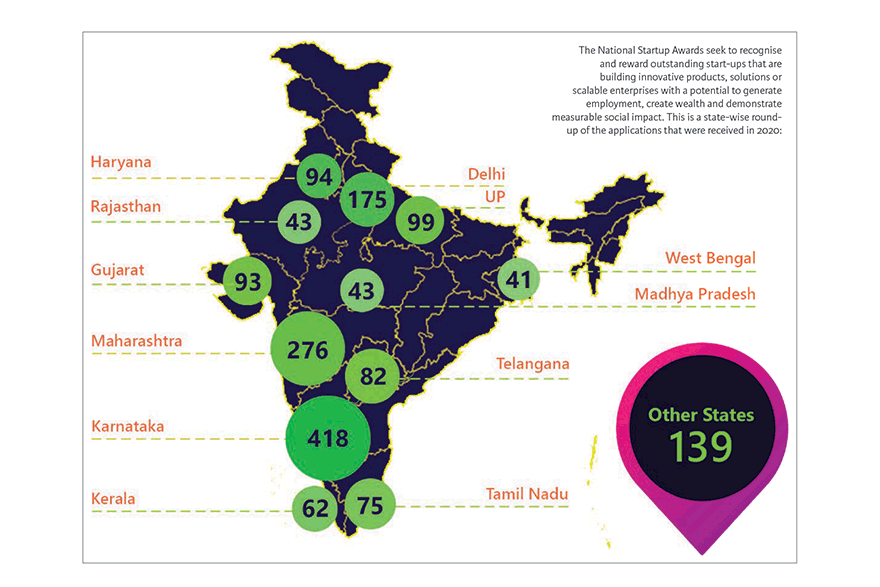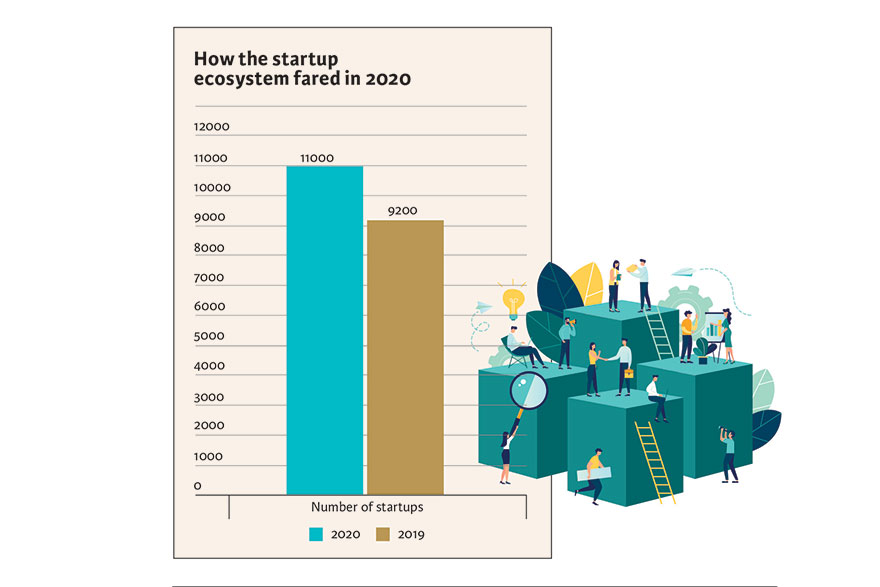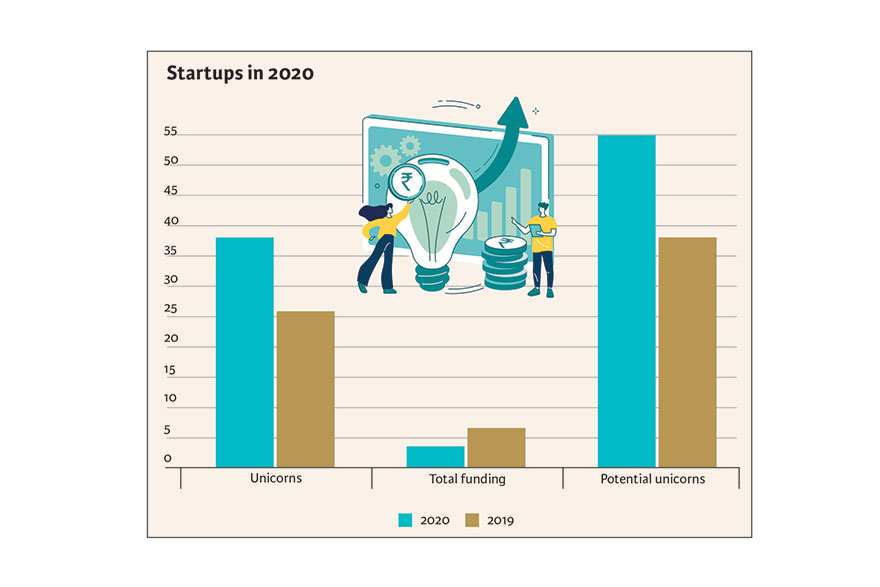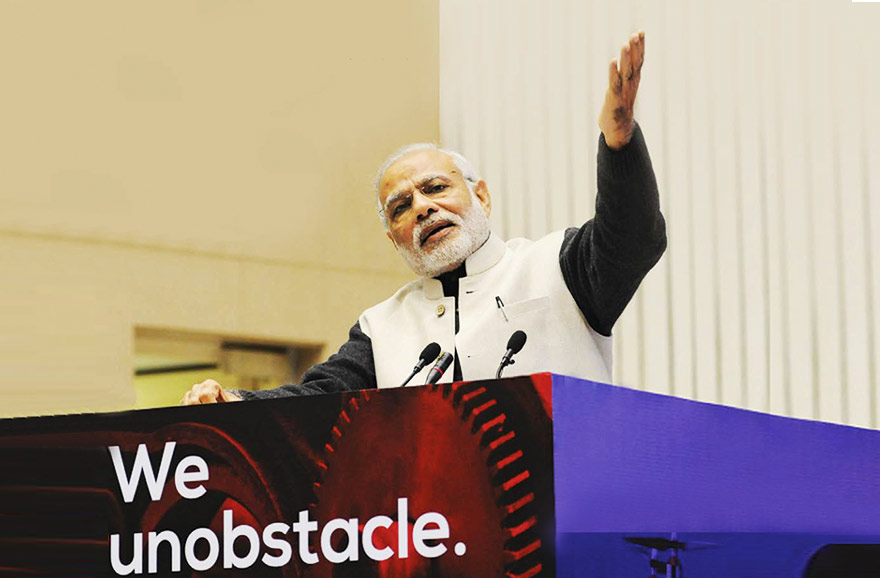Backed by rapid digitalisation, tech adoption and liberal government policies, India’s technology start-up ecosystem is witnessing a significant growth trajectory. The next step will be global expansion, says author and public policy expert Aashish Chandorkar
Akey tenet of Indian entrepreneurship growth in the last few years has been to support and catalyse job-givers in the economy. Given India’s fast workforce, it is critical that new employment opportunities are created by risk-taking first-generation entrepreneurs, who dream of building strong global firms out of India. Technology start-ups have been at the forefront of this thinking. There are 500 unicorns around the world. These are technology start-ups with more than USD one billion in valuation. Forty-four of them are now in India – about nine per cent of the total.
Twelve of these unicorns got to the coveted valuation benchmark in 2020 – a year otherwise throttled by the global pandemic. This shows that the Indian start-up ecosystem is not just innovative but also robust. The ability to scale up and demonstrate viable business models has set Indian start-ups apart. The 44 technology unicorns have been valued at more than USD 106 billion.

To put this in perspective, the market capitalisation of the National Stock Exchange is USD 2.7 trillion. The top 44 technology firms are already valued worth four per cent of the old economy, some of them being global leaders in their own right. These 44 firms have also created about 1.5 million jobs in direct or indirect employment.
Many of these jobs have been in the Gig economy sector (a free market system in which temporary positions are common and independent workers are hired for short-term commitments), which directly benefits job seekers who may not have the best educational qualifications, but who are willing to work hard towards improving their and their family’s standard of living.




That the Indian start-up ecosystem has come this far should hardly be a surprise. India has always had the brainpower behind some of the biggest technology firms globally. This brainpower used to make a beeline for foreign shores a few years ago. Now, many individuals are searching for opportunities locally and finding them. The access to capital for Indian start-ups is also rapidly improving.
Start-ups are the engines of exponential growth, manifesting the power of innovation. Several big companies today are start-ups of yesterday
With the world awash with liquidity owing to loose monetary policies of global central banks, India has attracted large investments. This is reflected year after year in the burgeoning Foreign Direct Investment (FDI) figures, where India is one of the hottest destinations. The next stop for Indian technology start-ups is to expand globally, conquering new markets. Given India’s market, which is not just large but also diverse in terms of consumer behaviour characteristics – the global leap of faith may be a matter of when and not if.

To facilitate Indian start-ups getting a platform alongside similar firms elsewhere, the Department for Promotion of Industry and Internal Trade (DPIIT), which works under the Ministry of Commerce and Industry, had organised Prarambh: Startup India International Summit in January 2021. This two-day summit was attended by several participants from BIMSTEC countries. BIMSTEC or Bay of Bengal Initiative for Multi-Sectoral Technical and Economic Cooperation (BIMSTEC) is an economic platform that India has been actively participating in. This event attracted investors, scholars, policy makers and start-up professionals from various member nations in a firstofits- kind exchange of ideas. Such global platforms are significant in the region, as many countries share a similar economic trajectory as well as consumer traits. The experience obtained in a large country like India can be transferred relatively easily to other markets, where it may be possible to apply the Indian success. In fact, several Indian productivity applications are already being used in other countries in the region.

Especially in the areas of merchant automation, new-age mobility, and social commerce and networking, there are already enough proofs of concept that the mantra for commercial success in India and other countries in the region may not be too different. Such platforms thus provide the exploratory opportunities for Indian start-ups to expand geographically. In the recently-presented Union Budget, the government has allowed Indian firms to list themselves overseas without listing in India first. The Indian securities market regulator is also working to create a facilitative environment to ensure such firms that opt to raise capital outside won’t be subject to dual jurisdictions and regulations.

These steps are critical in ensuring that growing and promising Indian firms are not starved for resources. In the recent past, the technology start-ups have also diversified. While the initial wave of unicorns came from FinTech (finance and technology) and consumer apps in food and mobility aggregation businesses, the recent success stories go much beyond. Technology innovators are now making a dent in varied areas like commercial logistics, merchant automation, construction management and healthcare. This change is critical for Indian economy as a whole, too.

As new players enter the market and start challenging long-time incumbents, yesteryear leaders are forced to respond in kind. This leads to new investments in research and development, and employee upskilling, which, in turn, leads to greater economic productivity and, eventually, higher wages. In this sense, start-ups also play a critical role in uplifting and modernising old economy players they compete with, creating a virtuous economic cycle. With an educated workforce, well integrated in the global ways of working, and a young nation comfortable with using mobile-first technology, Indian start-ups are on a fast growth trajectory. Some of these players will eventually become national and global business leaders in their own right.
Aashish Chandorkar writes on public policy, politics and current affairs. He takes interest in business, sports and technology, and has authored a book on Devendra Fadnavis, the former chief minister of Maharashtra, titled The Fadnavis Years. He holds an MBA from IIM Calcutta and a Bachelor of Engineering degree from Indore University
